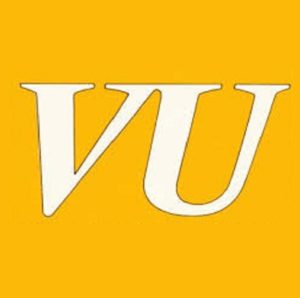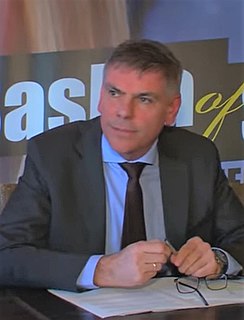Related Research Articles

Vlaams Blok was the name of a Belgian far-right and secessionist political party with an anti-immigration platform. Its ideologies embraced Flemish nationalism, calling for the independence of Flanders. The party originated from split within the Volksunie (VU) party after the right-wing separatist and national conservative wing became disgruntled with the compromise of accepting Belgian federalism over Flemish interests, and what they saw as the VU's move to the left. The former VU members created the Flemish National Party (VNP) and the Flemish People's Party (VVP) which formed an electoral alliance called Vlaams Blok in 1978, before merging to create Vlaams Blok as a political party in 1979. Vlaams Blok was the most notable militant right wing of the Flemish movement and its track record in the Flemish and Belgian parliament elections was strong, making it one of the most successful nationalist parties in Western Europe and it ultimately surpassed the People's Union in support. The party initially focused solely on the issues of Flemish autonomy and political freedom, which remained its core philosophy, but subsequently gained wider public support through broadening its campaigns to include immigration and law-and-order themes.

The Open Flemish Liberals and Democrats is a Flemish conservative-liberal political party in Belgium.

Christian Democratic and Flemish is a Flemish Christian-democratic political party in Belgium. The party has historical ties to both trade unionism (ACV) and trade associations (UNIZO) and the Farmer's League. Until 2001, the party was named the Christian People's Party.

People's Union was a Flemish nationalist political party in Belgium, formed in 1954 as a successor to the Christian Flemish People's Union.

The Flemish Movement is an umbrella term which encompasses various political groups in the Belgian region of Flanders and, less commonly, in French Flanders. Ideologically, it encompasses groups which have sought to promote Flemish culture and Dutch language as well as those who have sought greater political autonomy for Flanders within Belgium. It also encompasses nationalists who have sought the secession of Flanders from Belgium, either through outright independence or unification with the Netherlands.

Flanders is both a cultural community and an economic region within the Belgian state, and has significant autonomy.

Frank Arthur Hyppolite Vanhecke is a Belgian politician. Vabhecke started his career in Belgian politics as a student by joining the Jong Studentenverbond and later the Nationalistische Studentenvereniging. He gave up his membership of the Volksunie in 1977 after it acceded to a much-debated package of federal reforms. Vanhecke subsequently joined the Vlaams Nationale Partij, the predecessor of the Vlaams Blok.

Philip Michel Frans "Filip" Dewinter is a Belgian politician. He is one of the leading members of Vlaams Belang, a right-wing Flemish nationalist and secessionist political party. Together with Hugo Coveliers of the VLOTT party, Dewinter formed a list cartel for the city elections of Antwerp on 8 October 2006.

Hugo F.V. Coveliers is a retired Belgian politician and lawyer. He was a member of the Belgian Chamber of People's Representatives between 1985 and 1995 and from 1993 to 2003. Since 2003 he has been a member of the Belgian Senate. He was a parliamentary chairman for the VLD in both chambers, from 1999 to 2003.

Flemish political parties operate in the whole Flemish Community, which covers the unilingual Flemish Region and the bilingual Brussels-Capital Region. In the latter, they compete with French-speaking parties that all also operate in Wallonia. There are very few parties that operate on a national level in Belgium. Flanders generally tends to vote for right-wing, conservative parties, whereas in French-speaking Belgium the socialist party is usually the most successful one.

Matthias Edward Storme is a Belgian lawyer, academic and conservative philosopher.

Geert Albert Bourgeois is a Belgian politician of the New Flemish Alliance (N-VA), which he founded in 2001, who is currently serving as a Member of the European Parliament since 2019. He previously served as the Minister-President of Flanders from 2014 to 2019. Prior to this, he was a member of the federal Chamber of Representatives for the People's Union from 1995 to 2001, and then for the N-VA from 2001 to 2004. He has been involved in local and regional politics in Flanders since 1976.

The Dutch-speaking electoral college is one of three constituencies of the European Parliament in Belgium. It currently elects 12 MEPs using the D'Hondt method of party-list proportional representation. Previously it elected 13 MEPS, until the 2013 accession of Croatia. Before that, it elected 14 MEPs, until the 2007 accession of Bulgaria and Romania.
Hugo Schiltz was a Belgian lawyer and politician. He was Belgian MP from 1965 to 1988 and senator from 1992 to 1995. He was also twice minister, from 1981 to 1985 in the first Flemish Government and between 1988 and 1991 in the Belgian federal government Martens VIII. He was further president of the Flemish political party Volksunie between 1975 and 1979.
Jules Charles Stanislas Boedt was a Flemish-Belgian lawyer and liberal politician.

Frans Van Cauwelaert, was a Belgian Roman Catholic politician and lawyer.

Bart Albert Liliane De Wever is a Belgian politician. Since 2004 De Wever has been the leader of the New Flemish Alliance (N-VA), a political party advocating for the independence of Flanders. He is also a member of the Chamber of Representatives. De Wever played a prominent role in the 2007 Belgian government formation and presided over his party's victory in the 2010 federal elections when N-VA became the largest party in both Flanders and in Belgium as a whole.
The KVHV is a political student society which concerns Flemish nationalism and conservatism. It accepts male and female members and has chapters in Ghent, Leuven, Antwerp, Brussels, Aalst and Sint-Katelijne-Waver. Previously KVHV had chapters in Kortrijk, Ostend, and Mechelen.
Josse-Émile van Dievoet was a Flemish politician and lawyer. He served as Belgian Minister of Justice.
References
- ↑ E. de V., Lode Claes:Volksunie-senator en beheerder Bank Lambert, in: 't Pallieterke, 24 oktober 1972.
- ↑ Manu RUYS, Lode Claes, in: Nieuwe encyclopedie van de Vlaamse Beweging, Tielt, 1998
- ↑ Biografie Lode Claes in de Nieuwe Encyclopedie van de Vlaamse Beweging.
- ↑ Mudde, 2003, p. 85.
- ↑ Witte, Els; Craeybeckx, Jan (1985). Politieke geschiedenis van België sinds 1830 (Political History of Belgium Since 1830) (in Dutch) (4 ed.). Antwerpen: Standaard Wetenschappelijke Uitgeverij. p. 556. ISBN 90-02-15260-4.
- ↑ Lode Claes en de Vlaamse Volkspartij; Euro-synergies; 24 december 2012
- ↑ Lode Claes en de Vlaamse Volkspartij; Kristof Van De Vijver; Universiteit Gent; 2012
- ↑ Manu RUYS, Lode Claes, in: Nieuwe encyclopedie van de Vlaamse Beweging, Tielt, 1998.